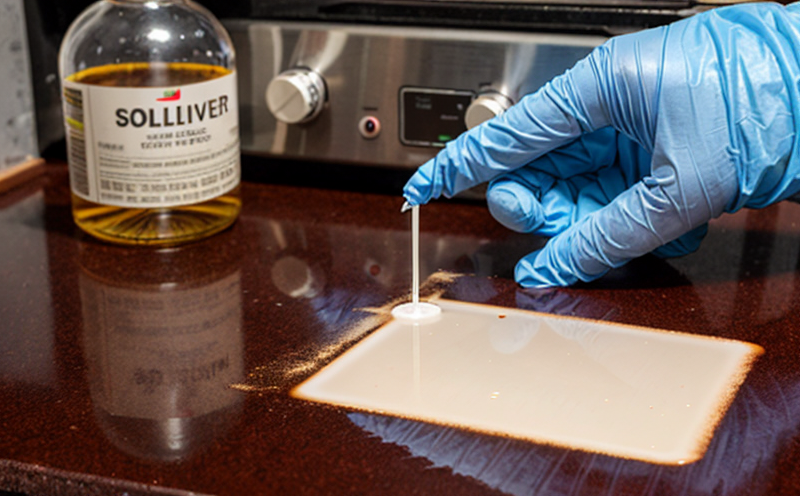Fungicide Solvent Residue Testing
The Fungicide Solvent Residue Testing service is pivotal in ensuring the safe and efficacious use of fungicides. This testing ensures that residual solvents do not adversely affect the environment, human health, or agricultural products post-application. The presence of excessive solvent residues can lead to a range of issues including soil contamination, water pollution, and potential toxicity concerns.
Our laboratory follows stringent protocols compliant with international standards such as ISO 17025 for proficiency in sample preparation and analysis. We utilize advanced analytical techniques like Gas Chromatography-Mass Spectrometry (GC-MS) to accurately quantify solvent residues in fungicides. This ensures reliable data that can be used by regulatory bodies, product developers, and quality assurance personnel.
Sample preparation is critical for accurate results. Our experts ensure the integrity of samples through precise extraction methods tailored to specific solvents. The use of appropriate solvents during this process minimizes interference with the analyte of interest. Once prepared, these samples undergo rigorous analysis using state-of-the-art equipment. The analytical steps include:
- Sample dissolution in a suitable solvent.
- Solid-phase extraction if necessary for purification.
- Injection into GC-MS for separation and identification.
The results are reported according to the agreed-upon criteria, often including method detection limits (MDLs), quantitation limits (QLs), and recovery rates. These data points provide comprehensive insights into the levels of solvent residues present in fungicides.
Understanding the environmental impact is crucial for sustainable practices. By identifying even trace amounts of solvents, our testing helps manufacturers adhere to stringent regulatory requirements such as those set by the Environmental Protection Agency (EPA) and similar bodies worldwide.
The importance of this service extends beyond compliance; it ensures consumer safety and product efficacy. Consumers need assurance that the fungicides they use are free from harmful residues which could compromise their health or affect beneficial organisms in agricultural ecosystems.
Why It Matters
The issue of solvent residues is significant because it touches upon multiple dimensions including environmental sustainability, public health, and product efficacy. Excessive solvents can lead to:
- Contamination of soil and water resources.
- Increased toxicity risks for humans and non-target organisms.
- Potential degradation of fungicide performance over time.
From an environmental perspective, reducing solvent residues supports the broader goals of sustainable development. By minimizing the use of solvents in fungicides, we contribute to preserving natural resources and reducing waste streams that could harm ecosystems. Public health is another critical consideration; ensuring that no harmful levels of solvents remain after application protects the well-being of end-users who may be exposed through various means.
Product efficacy plays a vital role as well. Excessive solvent residues can interfere with how fungicides function, potentially reducing their effectiveness against pathogens. This not only wastes resources but also increases costs for farmers and other users while diminishing the intended benefits of pest control measures.
Benefits
- Regulatory Compliance: Ensures that fungicide products meet all relevant regulatory standards, avoiding potential legal issues.
- Environmental Protection: By reducing solvent residues, this testing supports efforts to protect the environment and promote sustainable practices.
- Consumer Safety: Guarantees that end-users are not exposed to harmful levels of solvents when using fungicides.
- Innovation: Provides valuable data for R&D teams to innovate safer, more effective fungicide formulations.
Why Choose This Test
- Accurate Quantification: Utilizing advanced GC-MS technology allows for precise quantitation of solvent residues down to sub-part-per-million levels.
- Comprehensive Reporting: Detailed reports provide a comprehensive overview of the findings, including method detection limits and recovery rates.
- Expertise: Our team comprises highly qualified professionals with extensive experience in chemical analysis and fungicide testing.
- Reputation: Trusted by leading industry players for reliable and consistent results across diverse applications.
The Fungicide Solvent Residue Testing service is essential for maintaining the integrity of fungicide products. It plays a crucial role in ensuring that these chemicals are used safely and responsibly, thereby upholding both environmental standards and public health expectations. By choosing this test, stakeholders can contribute to creating a more sustainable future while also safeguarding their reputation and compliance.





